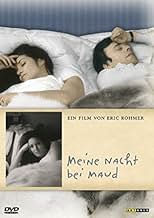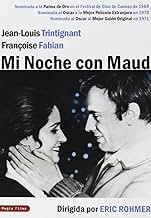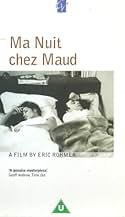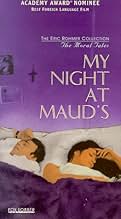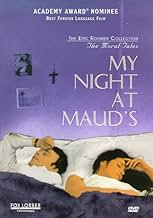Ma nuit chez Maud
- 1969
- Tous publics
- 1h 50min
Les principes inflexibles d'un catholique dévot sont contestés lors d'un séjour d'une nuit chez Maud, une femme divorcée avec une personnalité hors de toute dimension.Les principes inflexibles d'un catholique dévot sont contestés lors d'un séjour d'une nuit chez Maud, une femme divorcée avec une personnalité hors de toute dimension.Les principes inflexibles d'un catholique dévot sont contestés lors d'un séjour d'une nuit chez Maud, une femme divorcée avec une personnalité hors de toute dimension.
- Réalisation
- Scénario
- Casting principal
- Nommé pour 2 Oscars
- 6 victoires et 6 nominations au total
Avis à la une
Because it is a dialogue-driven piece, much more happens in the 54-minute-long "Suzanne's Career", Rohmer's second moral tale, than in "My Night at Maud's", which is about an hour longer. It can seem meandering at times, especially the first-half of the film, but put your trust in Rohmer. We're being bored to death for a reason. Listening to two Frenchmen discuss Pascal's Wager isn't very entertaining, but the payoff comes when, later on in the film, the characters are put into situations in which they have to make their own Pascal's wager, metaphorically speaking. The reward comes when we see these philosophies which they discussed tested in real-life situations, and we see how true, or untrue, to their ideals these characters are.
During the first fifty minutes, you may be bored out of your skull, but the way the film unfolds, you'll probably want to go back and watch the first fifty minutes again after it's over.
This is the Eric Romer film they warned you about. There is a lot of talk, talk, and more talk. But the talk is very interesting. One of the main topics of discussion is Pascal's famous wager. Pascal believed that if there is even the slightest chance of the Christian heaven being true, then as a matter of probability, one ought to be a believer. Even a minuscule chance of everlasting paradise is worth the bet because infinity (eternity) times even a very small number is infinity. And, of course, if not believing puts one in however small the danger of eternal damnation, then again one should be a believer. But, as Vidal (Antoine Vitez) sagely remarks in the movie, infinity times zero is still zero.
Jean-Louis Trintignant stars as a 34-year-old Catholic mathematician who has a way with women. He runs into his old school chum, Vidal, who introduces him to Maud (Francoise Fabian), who has a way with men. Funny but they don't quite hit it off even though she manipulates him into spending the night with her. Their conversation is witty, subliminal and revealing. Maud believes in the supremacy of love, Jean-Louis in being morally flexible. Although a believing and practicing Catholic, he tells Maud that one is not going against God's will by chasing girls anymore than one is going against God's will by doing mathematics.
The girl that Jean-Louis is currently chasing is 22-year-old Francoise (Maire-Christine Barrault) a blonde, Catholic girl that he has spied at church. At first it seems that although he is certain that she is perfect for him, she is reluctant. They too fence with words as they try to mislead and reveal at the same time, and the audience is intrigued, so much so that at times you might forget you are watching a movie. In this sense a Romer film is like a stage play. Whereas contemporary directors try to get by with as little dialogue as possible, to let the action itself reveal character, Romer is not shy about using dialogue to reveal character, plot, theme--the whole works.
The film begins with a long close shot of Francoise's profile as she listens in church, turning twice briefly to face the camera. She is pretty and intriguing. Although we won't realize it until the movie is mostly over, she is the focal point of the balance between the world views of Jean-Louis and Maud. After the night at Maud's during which Maud uses her intuition and sly intelligence to figure out Jean-Louis's character, he spends the night with Francoise. She uses her instincts to figure out not his character so much as his aptness for her. And then it is revealed how Francoise figures twice in the life of Maud. I won't anticipate the revelation, but be sure and watch for it. Suffice it to say that there are two reasons that Francoise is far from Maud's favorite person! The film ends, as French films often do, with the ironic affirmation of bourgeois values.
For today's DVD hound this movie will play slowly or not at all. The use of dialogue as something over and above the plot and action of the film will seem demanding and perhaps old fashioned. The deliberately drawn out scenes at church may cause you to yawn. But I recommend you stay with it. The movie has a quality that lingers long after the action is gone. The underlying philosophy about the nature of human love and how it conflicts or is compatible with reason and/or religion really does reflect to some extent the quotation above from Pascal, whose spirit is akin, although he denies it, to that of Jean-Louis, the careful protagonist of this very interesting film.
(Note: Over 500 of my movie reviews are now available in my book "Cut to the Chaise Lounge or I Can't Believe I Swallowed the Remote!" Get it at Amazon!)
"My Night at Maud's" is a spectacular work of art, which mainly consists of the intelligent discussion that goes on in the apartment of a woman named Maud over the coarse of one night. Of course, plenty of other things happen as well, but most of the film takes place during this one long discussion. Joining Maud is the main character, Jean-Louis, a Catholic man who seems to be in love with a woman (named Françoise, who becomes more of a major character later in the film), but hides it from Maude and his Marxist friend Vidal.
The film is an hour and 50 minutes of watching these wonderful characters talk and talk about various things, mainly things dealing with religion, love, etc. While a film almost entirely consisted of various characters chattering away may sound boring, it really isn't, mainly because the talking is so much fun (and really interesting) to listen to!
The film is also beautiful to look at, with gorgeous, black and white cinematography that really enhances the pretty cold tone of the film.
A really great piece of filmmaking!
Two men, Jean-Louis and Vidal meet again after 15 years. They decide to go to visit Vidal's friend, Maud. In Maud's apartment the group of three have interesting discussions about Pascal, philosophy, moral and religion. What makes these discussions so interesting is the difference of Vidal, Jean-Louis and Maud. Jean-Louis is a catholic who believes in the holiness of man. Vidal is a Marxist who replaces God with history, he believes in history instead of God. Maud is an atheist, who believes in true short-term happiness. When Vidal leaves the apartment, Jean-Louis gets to a moral dilemma.
Jean-Louis talks a lot about a young blond woman he saw in church, Francoise. He doesn't know anything about her, but she represents religious and an ideal woman to him. Where Maud is the opposite to him. Jean-Louis doesn't believe in short-term happiness. So as he spends the night at Maud's he gets to a moral dilemma. According to his religious beliefs he should resist the temptation of Maud. Again his lie to Francoise is Christian compassion, but it's also a desire to hide his dishonesty.
My Night at Maud's goes very deep. It's not just about what's on surface: the intellectual dialogs and the moral dilemmas. The intelligence of Rohmer goes much deeper. And that is what I like in his films, even if you don't understand everything, the films have something that make you watch them again and again. I'm 17 and when I walked into a dark theater to see this fine film, I was blown away. When the film is over, you have came from a moral journey. So Eric Rohmer's film, obviously doesn't just stop at being the battlefield of ideologies.
After Vidal leaves, Maud tells Jean-Louis about her marriage, her ex-husband's Catholic mistress, and the tragic end to her affair with the only man she truly loved. When he is persuaded to avoid a snowstorm and stay overnight, Jean-Louis has to overcome Maud's advances and his own temptations to remain faithful to his ideal mate, a blond, Catholic girl (Marie-Christine Barrault) he recently met at church.
This was the first film I'd seen by Eric Rohmer and it was a puzzle to penetrate the uniqueness of his style and rhythm. Rohmer presents his characters in very natural, almost mundane situations, and heightens the realism by using only natural sounds of the environment. On the surface, the film appears very simple but underneath there is much complexity. Jean-Louis is conflicted between his Catholic principles and his love of sensual pleasure. He lives in a world centered almost entirely on himself, engaging in much philosophizing about choice but never choosing. He operates out of how he "should" or "should not" act rather than out of his experience of what works. When life does not fit his pictures, he deceives himself with endless rationalizations. Through his experience with Maud, however, he is shaken out of need for complete self-control and discovers the epiphany of grace.
Rohmer has a light touch and employs intelligent and witty dialogue to bring his characters to life. In the process, he creates an impersonal elegance that is totally captivating. Rohmer doesn't set out to change our lives just to make us think, and in My Night at Maud's, he succeeds admirably.
Le saviez-vous
- AnecdotesJean-Louis Trintignant's character is never called by name in the entire film. He is shown in credits as "Jean-Louis."
- GaffesWhen Jean-Louis Trintignant accepts to climb into bed with Françoise Fabian, he motions for her to pass him the blanket, extending his right hand holding a lit cigarette. The next shot from the side shows him grasping the blanket with a cigarette-free right hand.
- Citations
Jean-Louis: Are you still a Marxist?
Vidal: Absolutely. For a Communist, Pascal's wager is very relevant today. Personally, I very much doubt that history has any meaning. Yet I wager that it has, so I'm in a Pascalian situation. Hypothesis A: Society and politics are meaningless. Hypothesis B: History has meaning. I'm not at all sure B is more likely to be true than A. More likely the reverse. Let's even suppose B has a 10% chance of being true and A has 80%. Nevertheless I have no choice but to opt for B, because only the hypothesis that history has meaning allows me to go on living. Suppose I bet on A, and B was true, despite the lesser odds. I'd have thrown away my life. So I must choose B to justify my life and actions. There's an 80% chance I'm wrong but that doesn't matter.
Jean-Louis: Mathematical hope. Potential gain divided by probability. With your hypothesis B, though the probability is slight, the possible gain is infinite. In your case, a meaning to life. In Pascal's, eternal salvation.
Vidal: It was Gorky, Lenin or maybe Mayakovsky who said about the Russian revolution that the situation forced them to choose the one chance in a thousand. Because hope became infinitely greater if you took that chance than if you didn't take it.
- ConnexionsFeatured in La 82e cérémonie des Oscars (2010)
Meilleurs choix
- How long is My Night at Maud's?Alimenté par Alexa
- What are the names of all six of Rohmer's moral tales?
Détails
- Date de sortie
- Pays d’origine
- Site officiel
- Langue
- Aussi connu sous le nom de
- Six contes moraux III: Ma nuit chez Maud
- Lieux de tournage
- Sociétés de production
- Voir plus de crédits d'entreprise sur IMDbPro
Box-office
- Montant brut mondial
- 11 088 $US
- Durée1 heure 50 minutes
- Couleur
- Mixage
- Rapport de forme
- 1.33 : 1
Contribuer à cette page



